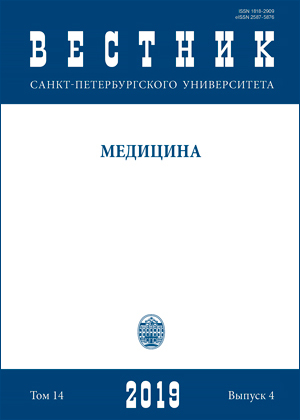Anti-thyroid autoimmunity and psychic disorders*
DOI:
https://doi.org/10.21638/spbu11.2019.407Аннотация
Thyroid hormones are essential for normal brain development and function, also regulatingsome processes in im mune system. The vicious effect of hypothyroidism for central nervous system displayed in myxoedema is known for many decades, but there is a CNS disorder related to autoimmune thyroid disease and not merely dependent on hypothyroidism. That is Hashimoto’s encephalopathy (steroid-responsive encephalopathy of autoimmune thyroiditis) — an enigmatic combination of cognitive, mood and motor disorders with psychotic symptoms, which pathogenesis is still unclear. The article describes natural history of this entity, its epidemiology, clinical and laboratory manifestation, and compares several existing theories of its pathogenesis with appropriate pros and contras. Vascular, dyshormonal and non-vascular autoimmune links of Hashimoto’s encephalopathy pathogenesis are discussed in intermingled discourse. The attempt to construct a synthetic concept of Hashimoto’s encephalopathy pathogenesis is given. The experience of authors based on investigation of clinical, endocrine and immunological parameters of 17 cases of autoimmune thyroiditis with schizophrenia-like manifestations is described, correlations are explored between immunoendocrine and psychic manifestations of disease
Ключевые слова:
autoantibodies, Hashimoto’s thyroiditis, Hashimoto’s encephalopathy, steroidresponsive encephalopathy associated with autoimmune thyroiditis, schizophrenia, autoimmune encephalitis, psychosis
Скачивания
Библиографические ссылки
References
Загрузки
Опубликован
Как цитировать
Выпуск
Раздел
Лицензия
Статьи журнала «Вестник Санкт-Петербургского университета. Медицина» находятся в открытом доступе и распространяются в соответствии с условиями Лицензионного Договора с Санкт-Петербургским государственным университетом, который бесплатно предоставляет авторам неограниченное распространение и самостоятельное архивирование.




